Rugby World Cup 2015: Winning Scotland approach crossroads
- Published
When Scotland retreated to their dressing room at half-time at Elland Road, trailing the Americans 13-6 on the back of an error mountain as high as the Don Revie stand, it's safe to say Cotter didn't choose that moment to reveal his softer side - if, indeed, he has a softer side.
There's no evidence of it yet but ,like the holy grail, the search goes on.
These Scottish players are a fairly stoic lot and the chances are that what Cotter said to them to bring about the 39-16 win will stay forever between the team, the coach and the four walls, but it can't have been pretty.
Scotland stymieing themselves with their own lack of accuracy and intensity would have been a theme, though. Their beaten scrum would have been a focus. Their resounding defeat in the physical stakes would have been something that Cotter addressed.
There was a pep about America and a vulnerability about Scotland that was worrying. Cotter's team had butchered opportunities. The verve of the last half-hour at Kingsholm, where Scotland had lacerated Japan four days prior, had gone. His counterpart, Mike Tolkin, might have sensed an upset. He wouldn't have been alone.
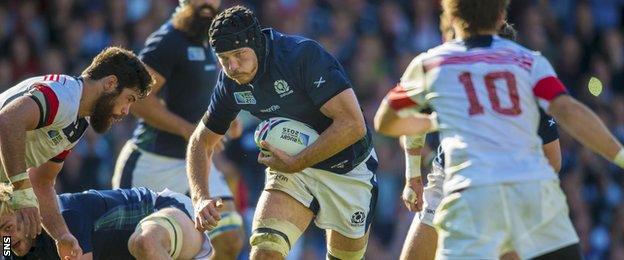
Scotland were in need of direction and dynamism after half-time
Prop Nel established
Scotland had played with a passiveness the coach had seen enough of. He made two substitutions at the break. Both props, Ryan Grant and Jon Welsh, were yanked off the field and replaced by the go-to men, Alasdair Dickinson and WP Nel.
Things changed quickly. Cotter said later there were no rockets launched in that dressing room at half-time but something propelled Scotland into action.
They became a different team. Tighter, tidier, more accurate, more physical, more tuned in to what they were supposed to be doing. In a word, dominant.
Dickinson and, most particularly, Nel helped fix the problems in the scrum. Nel stabilised the set-piece, got it moving forward, carried ball, then scored a try.
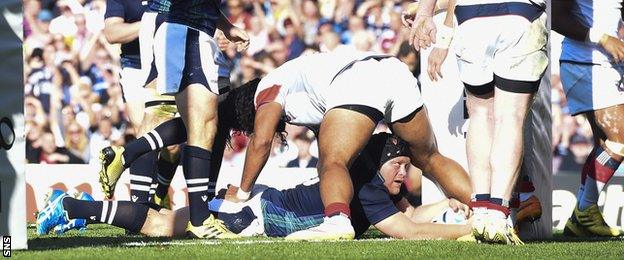
WP Nel was among Scotland's most impressive substitutes
In a short space of time the South African has become a big player for Scotland. Nobody talks about his route into this team any more. Nobody scoffs and says it's just not right that he's allowed to wear the jersey. That's the ultimate illustration of his progress. He has hushed the talk of the residency rule, just as John Hardie has silenced his doubters. For now, at least.
Scotland found a way to score and to win. Nel, Dickinson, Tim Swinson and Richie Gray created the platform and the backs added the gloss. For the second game in this World Cup they clawed their way through difficult moments and won pulling away.
Winning with style
That's the big shift in Scotland's game. Where before they couldn't score - they went try-less in three games out of four at the World Cup in 2011 - now they look dangerous just as soon as the forwards have done their stuff and laid the foundations.
There was a time - and you don't need the memory of an elephant to recall it - when Scotland as a rugby nation would have taken your arm out of its socket had you handed them one five-try victory never mind two. That's what they have achieved against Japan and America.
Two wins, two bonus points, 10 tries. That's a fine haul. We are now entering the truly testing period of this World Cup, though. The behemoths are rumbling in Scotland's direction. First South Africa, then Samoa.
It would be easy to say that everything in Scotland's garden is rosy, but nobody thinks that, least of all Cotter. He has understandable pride in his team showing the character and the class to put America away just like they put Japan away, but there has to be many questions in his head all the same.
The treatment table
The injuries, firstly. Grant Gilchrist went off early against America and Finn Russell went off after the hour. The medics won't report on either of them for 24 hours. The vibe is that both of them were removed as a precaution rather than anything more serious.
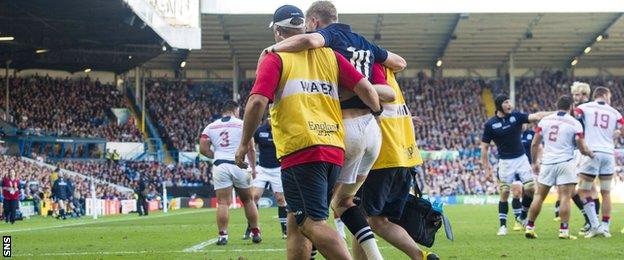
Finn Russell was helped from the field midway through the second half
The hope is that the vibe is correct. For different reasons - ball-carrying physicality in Gilchrist's case and irrepressible creativity in the case of Russell - both would be a grievous loss for South Africa on Saturday.
Every training session and every match will be torturous for Cotter from hereon in. He can't afford to lose Dickinson or Nel in his front row and the quicker Hardie returns to the back row, the better. Scotland have options in places but are desperately thin in others.
If they are to trouble the born-again Boks then everybody needs to be available - and firing. Firing from the start, too. Scotland's slow starts might keep Cotter awake at night.
A second straight poor beginning to a match is a puzzler. In the past week, Scotland came up against a pair of sides that they could, eventually, play their way around and beat with ease despite early problems. That luxury won't exist in Newcastle against the Springboks and it probably won't exist against Samoa a week later either.
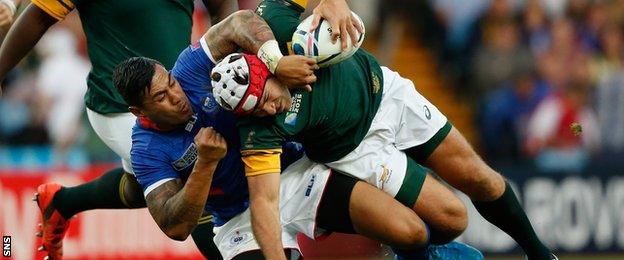
South Africa and Samoa await Scotland
Opportunity beckons, meaty obstacles remain
As a team they are in a tantalising place; possibly good enough to take South Africa to the wire if they produce their very best stuff but vulnerable enough to get stuffed down a hole that they won't crawl out of should they reproduce the weaknesses of the first half at Elland Road.
Scotland have coasted so far and are now approaching the crossroads. The traffic will be brutal and their decision-making had better be right or else they'll get mown down.
Behind that deadpan exterior, Cotter will have run the gamut of emotions watching his team; confusion, anger, appreciation and pride. We know this team is improving. What we don't know is which of its twin personalities will turn up in the coming weeks - and how long they'll stick around for.
- Published27 September 2015
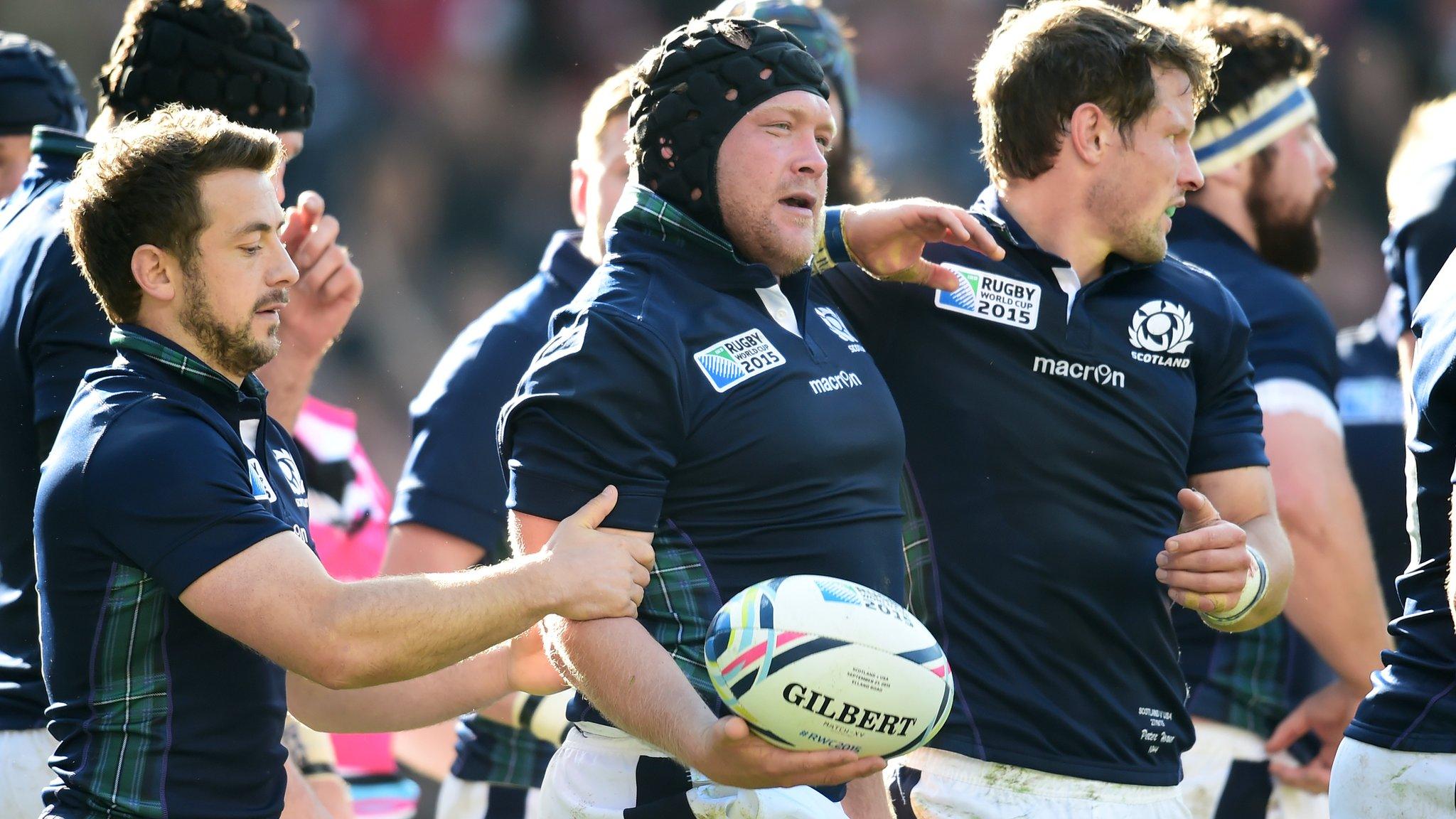
- Published24 September 2015
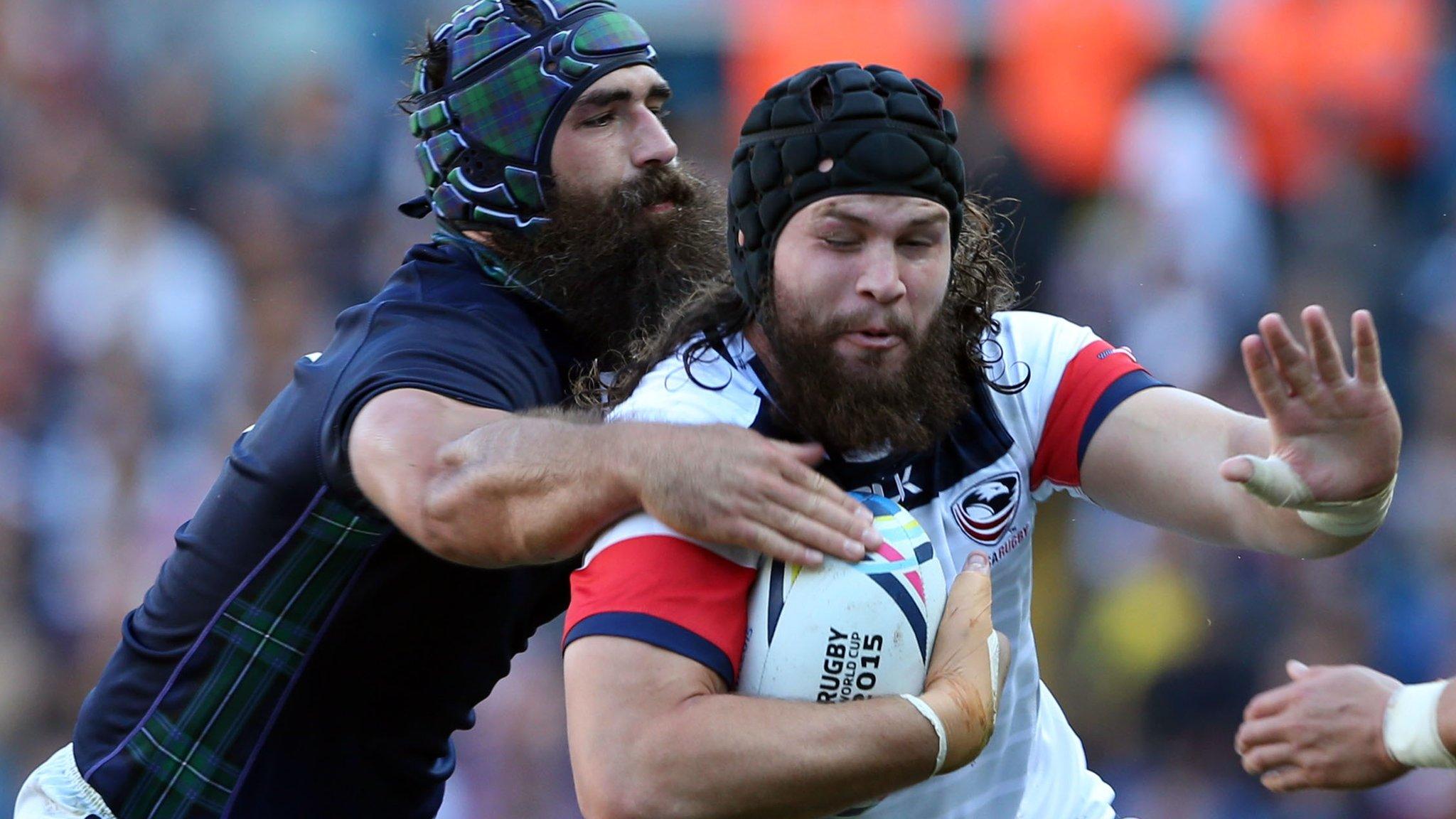
- Published27 September 2015
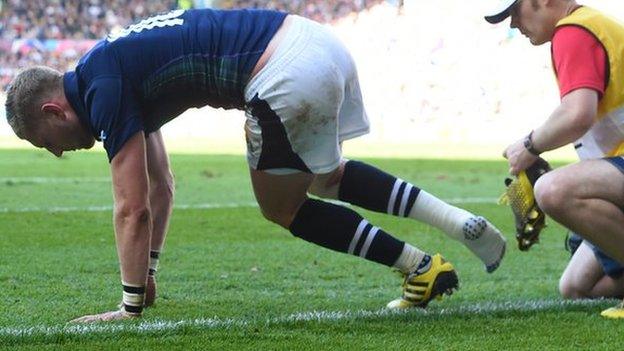
- Published14 September 2016
